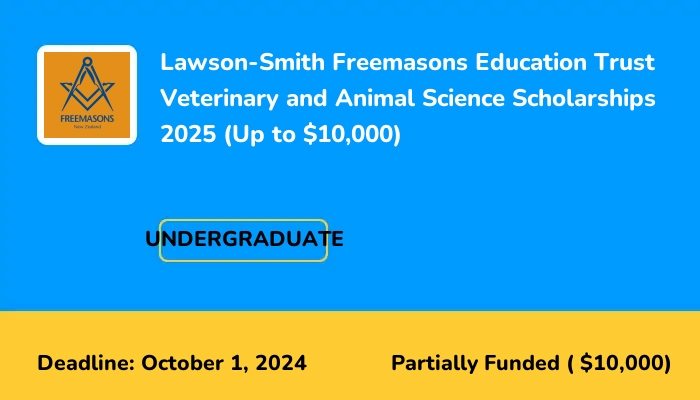
Your Path to a Passionate Career: Unlocking Animal Science Scholarships
I remember the exact moment I decided I wanted to work with animals. It wasn’t a sudden flash, but a slow, growing certainty that bloomed during countless hours spent at a local animal shelter, cleaning kennels and learning the individual quirks of every dog and cat. Their silent trust, their boundless energy, their vulnerability – it all spoke to me in a way nothing else ever had. I knew, with every fiber of my being, that my future lay in understanding them, caring for them, and advocating for them. That’s when I first whispered the words, "Animal Science," and felt a thrill run through me.
But then, the practicalities hit, much like a cold shower after a warm dream. University tuition. Living expenses. Textbooks. The sheer cost of pursuing a degree in animal science or veterinary medicine felt like an insurmountable mountain. My family, while incredibly supportive, didn’t have pockets deep enough to simply hand me a blank check for what would likely be years of advanced education. I felt that familiar knot of anxiety tighten in my stomach. Was my dream destined to remain just that – a dream?
That’s when a kind soul, a volunteer coordinator at the shelter who had seen countless aspiring animal professionals come and go, pulled me aside. "Have you looked into animal science scholarships?" she asked, her eyes twinkling with a knowing light. I hadn’t, not really. I thought scholarships were only for academic superstars or elite athletes. My grades were good, sure, but I wasn’t curing cancer in a lab. What she said next, though, changed everything. "There’s money out there for passion, for dedication, for people who genuinely want to make a difference. You just have to know where to look, and how to tell your story."
Her words were a spark, igniting a new kind of quest for me. This wasn’t just about getting into a program; it was about finding a way to afford my passion. I dove headfirst into the world of financial aid, and what I discovered was an incredible tapestry of opportunities waiting for students like me. I learned that scholarships for animal science are not just a myth; they are a very real lifeline for thousands of students pursuing careers ranging from veterinary medicine and animal husbandry to wildlife conservation and animal welfare.
My first port of call was always the universities themselves. Before even applying to a specific program, I spent hours poring over each university’s financial aid page. Many institutions have their own dedicated scholarships specifically for students entering their animal science programs or pre-veterinary tracks. These can be departmental scholarships, funded by alumni or university endowments, and they often look for students who demonstrate academic promise, leadership potential, and a clear commitment to the field. I remember one university had a "Dean’s Animal Science Scholar" award, which required a separate essay detailing my experience and future aspirations. It felt good to write that essay, to articulate exactly why I belonged in their program.
Beyond the universities, I started casting a wider net. This is where the real detective work began, and honestly, where I found some of the most unique opportunities. Professional organizations in the animal industry are a treasure trove of funding. For instance, if you’re looking at a veterinary career, associations like the American Veterinary Medical Association (AVMA) and various state veterinary medical associations often offer scholarships to aspiring vets. Similarly, if your interest leans more towards agriculture and livestock, organizations like the National FFA Organization (Future Farmers of America) or various beef, dairy, or swine associations have numerous scholarships available. These aren’t just for farm kids; many are open to anyone demonstrating an interest in the industry.
I also stumbled upon scholarships from private companies that have a stake in the animal world. Think about it: pet food companies, animal pharmaceutical manufacturers, agricultural equipment suppliers. These businesses often invest in the future of the industry by funding student education. I recall finding a scholarship sponsored by a major pet food brand that specifically sought students involved in animal nutrition research or companion animal welfare. It was a perfect fit for my volunteer work at the shelter, where I’d learned so much about the impact of good nutrition on an animal’s health.
Then there were the foundations and non-profit organizations dedicated to specific aspects of animal life. For those dreaming of working with wild animals, wildlife conservation scholarships are out there, offered by groups like the World Wildlife Fund (WWF) or smaller, regional conservation societies. If your heart is with animal welfare and advocacy, organizations focused on humane treatment and animal rights often provide financial aid to students pursuing related studies. This category was particularly exciting because it aligned so closely with my personal values and experiences. I remember applying for a scholarship from a local humane society foundation, describing how my volunteer work had shaped my understanding of animal suffering and my resolve to contribute to solutions.
The application process itself can feel daunting, especially when you’re applying for several scholarships at once. Each one often has slightly different requirements, but there are common threads that I learned to master.
First, research is paramount. Don’t just skim the surface. Read every line of the scholarship description. What are they truly looking for? Is it academic merit, financial need, specific extracurriculars, or a combination? Understanding their priorities helps you tailor your application.
Second, gather your documents early. This usually includes official transcripts, letters of recommendation, and a well-crafted resume or CV. For letters of recommendation, I always approached teachers, mentors, or supervisors who knew me well and could speak genuinely about my character, work ethic, and passion for animals. I made sure to give them plenty of notice and provided them with a brief summary of my achievements and the scholarship’s focus, so they could write a targeted letter.
But the real heart of any scholarship application, I discovered, is the personal statement or essay. This is your chance to tell your story, to let your passion shine through. I learned to treat each essay as an opportunity to connect with the scholarship committee on a personal level. Instead of just listing my accomplishments, I focused on narrative. I talked about the specific moments that ignited my interest in animal science – the time I helped rehabilitate a frightened rescue dog, or the awe I felt watching a documentary about endangered species. I explained why these experiences mattered to me and how they shaped my career aspirations.
I remember one scholarship essay where the prompt was, "Describe a challenge you’ve faced and how you overcame it." I wrote about my initial fear of handling large, boisterous dogs at the shelter and how, through patience and learning their body language, I not only overcame that fear but built incredible bonds with them. It wasn’t just about dogs; it was about perseverance, empathy, and growth – qualities that are valuable in any field, but especially in animal science. I always made sure to link my experiences back to the specific area of animal science the scholarship was designed to support. If it was for agriculture, I’d highlight any exposure to farm animals or food production. If it was for research, I’d talk about my curiosity and problem-solving skills.
And here’s a crucial tip: tailor each essay. It’s tempting to write one general essay and copy-paste it, but scholarship committees can spot that a mile away. Each application deserves a unique touch, showing you’ve actually read their specific criteria and are genuinely interested in their scholarship. It’s about demonstrating that you understand their mission and how you fit into it.
Sometimes, a scholarship application might include an interview. My first interview was nerve-wracking, but I learned quickly that they weren’t trying to trick me. They simply wanted to see the person behind the paper. I practiced articulating my goals, discussing my experiences, and asking thoughtful questions about the scholarship and the organization. Being genuine and enthusiastic goes a long way.
Finally, proofreading is non-negotiable. A single typo can undermine an otherwise perfect application. I’d read my essays aloud, then have a friend or family member read them. Fresh eyes often catch mistakes you’ve overlooked.
Looking back, there are a few key lessons I wish I had known from the very beginning that made a huge difference in my quest for animal science scholarships:
- Start early, really early. The scholarship search is not something to put off until the last minute. Many deadlines are months before university application deadlines. Getting a head start gives you time to thoroughly research, gather materials, and craft compelling essays without feeling rushed.
- Don’t limit yourself. Apply for scholarships even if you think you’re only a partial fit. You never know what might catch a committee’s eye. I applied for dozens, and while I didn’t get them all, the ones I did receive were life-changing. Cast a wide net!
- Show, don’t just tell, your passion. Committees want to see evidence of your commitment. Volunteer work, internships, personal projects, even active participation in animal-related clubs at school – these all demonstrate your genuine interest beyond just good grades. My extensive hours at the shelter were probably the single most impactful thing on my resume.
- Grades matter, but they’re not the only thing. While academic excellence is often a criterion, many scholarships prioritize leadership, community involvement, unique experiences, or simply a compelling personal story. Don’t be discouraged if you’re not a straight-A student. Your unique journey and dedication can be just as, if not more, persuasive.
- Networking can open doors. Talk to your professors, mentors, and professionals in the animal science field. They might know about obscure scholarships or have connections to organizations offering financial aid. I learned about a regional agriculture scholarship through a connection I made at a local farm tour.
- Don’t give up. Rejection is part of the process. I received plenty of "no, thank you" letters. It’s easy to get disheartened, but each rejection was just a redirection. I learned from it, refined my approach, and kept applying. The scholarships I eventually received made all the effort worthwhile.
Beyond scholarships, I also explored other financial avenues. Part-time jobs, especially those related to animal care, were great for both earning money and gaining experience. I also looked into student loans, but I always considered them a last resort, prioritizing scholarships and grants that didn’t require repayment. The goal was to minimize debt so I could focus on my studies and future career without a heavy financial burden.
The scholarships I received weren’t just about money; they were about validation. They were proof that others believed in my potential, in my dream to work with animals. This belief fueled my motivation through challenging courses and long nights of studying. It allowed me to focus on learning and gaining practical experience rather than constantly worrying about how to pay the next tuition bill. It gave me the freedom to pursue internships that weren’t always paid but offered invaluable hands-on learning, something I wouldn’t have been able to do if I had been solely focused on earning wages.
Today, as I navigate my career in animal science, I often think back to that kind volunteer coordinator and her simple question. Her advice set me on a path that didn’t just lead to a degree, but to a fulfilling career where I get to make a difference in the lives of animals every single day.
So, if you’re standing at the crossroads, passionate about a future in animal science but daunted by the financial realities, please hear this: Your dream is valid, and there are resources out there to help you achieve it. Don’t let the cost overshadow your passion. Start your scholarship search today. Tell your story. Show your dedication. The world of animal science needs your enthusiasm, your intelligence, and your heart. Go out there and find the funding that will unlock your path to a truly rewarding future. The journey might be challenging, but every step you take towards securing those animal science scholarships is a step closer to living your dream.


